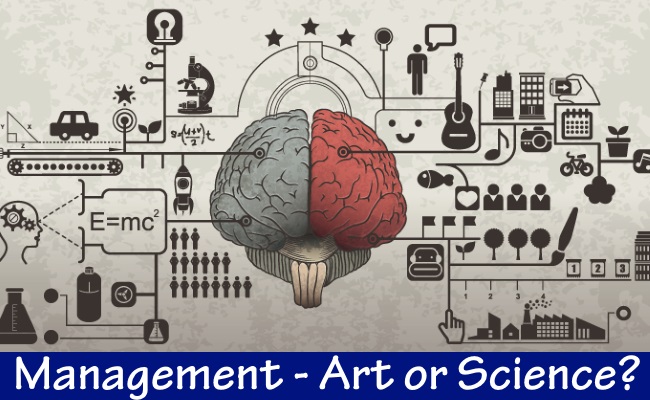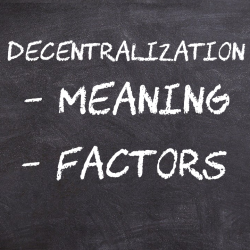Is Management an Art or Science – Discussion
Table of Contents
Management – Art or Science?
The controversy with regard to the nature of management, as to whether it is an art or a science, is very old. This controversy, however, is not very much in the air now though the controversy is yet to be settled.
It is to be noted that the learning process in art differs from that of science. Learning of art involves its continuous practice while learning of science basically involves the assimilation of principles.
Much of the controversy of management being as art or science is on account of the fact that the earlier captains of industry and managers have used intuition, hunches, commonsense, and experience in managing organizations. They were not trained professional managers, although they were very brilliant and had developed commonsense through which they managed well. However, commonsense and science differ considerably in solving the problems.

Management as an Art
Art is defined as the use of skills to bring a desired result. Skills refer to one’s proficiency to do a specific work. Thus, art has the following features:
1. Practical Knowledge
Knowledge refers to possession of facts and techniques of a particular field. Knowledge can be acquired through study and/or practical experience. Generally, in art, more emphasis is given on acquiring knowledge through practical experience. In management, knowledge is acquired both through study and experience. Thus, management is an art.
2. Personalized Application of Knowledge
In art, there is personalized application of knowledge to achieve the desired results. This is possible because the same set of results can be achieved through a number of alternative ways. This is done in management too; each manager has his own way of achieving results. Thus, management is an art.
3. Improvement through Continuous Practice
In art, improvement is made through continuous practice. This practice eliminates those activities which are not relevant for achieving the desired results and improving those activities that are relevant. Through this way, the person engaged in any art tends to move towards perfection. This is exactly done in management.
4. Situational Application
Art has situational application. This implies that an art which is appreciated in one situation may not be appreciated in another situation. This is true for management too. Thus, a particular management practice which is quite effective in an organization may not be effective in another organization because of change in situational context.
Further, in the same organization, management practices may change over the period of time because of change in contextual variables.
5. Emphasis on Creativity
Art puts emphasis on creativity through which new things or ways of working are created. This is done in management too; managers create new products, new ways of working, new means of financing, new ways of marketing and so on.
The above discussion shows that management is an art.
Management as a Science
Science is a body of systematized knowledge generated through logical consistency, critical evaluation and experimental study. Thus, science has the following features:
1. Systematized Body of Knowledge
Science is a systematized body of knowledge. Its principles are based on cause-effect relationship, that is, a particular factor has been caused by what factor can be explained in a definite way.
For example, if you throw a ball up, after going upward the ball will ultimately come back on the ground because of earth’s gravitational force. In management, there is lack of such a cause-effect relationship; cause-effect relationship is defined in flexible way, not in definite way. Thus, management is not a true science.
2. Principles Based on Experimentation
In science, principles are evolved on the basis of experiments conducted in laboratories. Such principles are tested again and again for final approval. In management, this is not done in all cases; in many cases, management principles are based on personal observations and experiences.
Though experiments are conducted under controlled conditions, their findings are not tested like science. From this point of view, management is not a true science.
3. Verifiable Principles
Scientific principles can be verified by any one. Such verification will give the same results again and again. Management principles are not verifiable in many cases. In fact, in many cases, it is difficult to appreciate the bases on which management principles have been evolved. Thus, management is not a true science.
4. Universal Application
Principles of science have universal application, that is, they remain true irrespective of the conditions in which these are applied. As against this, management principles are situation bound. It implies that a management principle which works well in one country may not work equally well in another country. This is because of situational differences between the two countries.
Further, a management principle which works effectively in one organization may not work effectively in another organization of the same country. Thus, management cannot be called ‘true science’.
The above discussion shows that management is not a true science. Therefore, management is called an ‘inexact science‘ or ‘pseudo-science‘.
Management: Both Art and Science
Thus, to be a successful manager, a person requires the knowledge of management principles and also the skills of how the knowledge can be utilized. Absence of either will result in inefficiency.
A comparison between art and science is presented in the below table which suggests that a manager requires both aspects of management to be successful.
Comparison between art and science as used in management
| Art | Science |
|---|---|
| Advances by practice | Advances by knowledge |
| Feels | Proves |
| Guesses | Predicts |
| Describes | Defines |
| Opines | Measures |
| Expresses | Impresses |
It can be seen that management uses both scientific knowledge and art in managing an organization. As the science of management increases so should the art of management. A balance between the two is needed. Neither should be over-weighed or slighted.
Some feel that further gains in science of management will restrict art more and more. This is true to a limited extent only. The fact remains that to be useful, knowledge of science must be applied, that is, art must be present. Therefore, the old saying that ‘knowledge is power‘ is partially true.
The correct saying should be ‘applied knowledge is power‘. People having abundant knowledge may have little use if they do not know how to use knowledge. This is particularly true for management which is a situational phenomenon.


